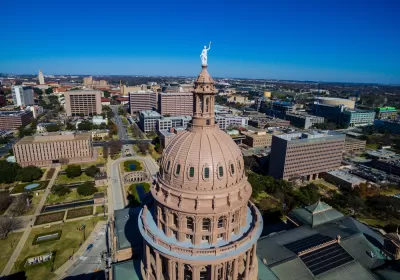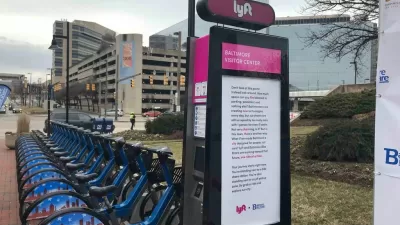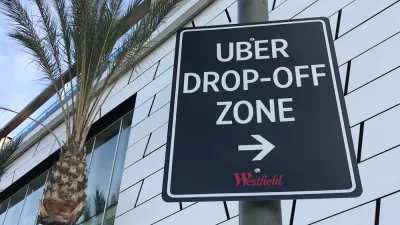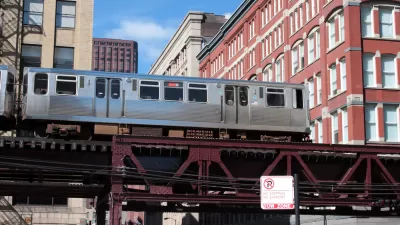A new Texas state law that regulates transportation network companies also overrides more restrictive local regulations, like Austin's requirement for fingerprinting drivers. Austin voters supported the tighter regulations at the ballot box last May.

On Memorial Day, Gov. Greg Abbott signed House Bill 100, which effectively ends the ban on ride-hailing enacted by the Austin City Council in December 2015 and supported by voters in May 2016.
Uber and Lyft put restrictions such as finger print requirements to a ballot test on May 7, 2016 with Proposition 1, but 56 percent of voters rejected the measure to overturn the regulations. The two companies suspended service in the city the following morning. [See Planetizen: "Op-Ed: Why Uber Wasn't Welcome in Austin."]
HB 100 "will override local provisions and provide regulatory certainty, creating a consistent framework across the state for popular ride-hailing companies, while still enforcing important customer safety standards," states the governor's office on the bill signing.
"It requires ride-hailing companies to have a permit from the Texas Department of Licensing and Regulation [TDLR] and pay an annual fee of $5,000 to operate throughout the state," reports Alex Samuels for The Texas Tribune. "It also calls for companies to perform local, state and national criminal background checks on drivers annually — but doesn't require drivers to be fingerprinted."
According to the department's FAQs on Transportation Network Companies (TNCs), they anticipate "publishing rules for the TNC program in the Texas Register on July 28, 2017, and adopting rules no later than September 29, 2017. Based on this timeline, we expect the TNC rules to take effect on November 1, 2017."
However, the ride-hailing companies need not wait for the publication of the rules. "Uber and Lyft said they resumed operations in Austin on Monday," adds Samuels. "Lyft also said it would relaunch in Houston on Wednesday (Uber is already operating in Houston.)"
FULL STORY: Uber, Lyft return to Austin as Texas Gov. Abbott signs ride-hailing measure into law

Alabama: Trump Terminates Settlements for Black Communities Harmed By Raw Sewage
Trump deemed the landmark civil rights agreement “illegal DEI and environmental justice policy.”

Study: Maui’s Plan to Convert Vacation Rentals to Long-Term Housing Could Cause Nearly $1 Billion Economic Loss
The plan would reduce visitor accommodation by 25% resulting in 1,900 jobs lost.

Planetizen Federal Action Tracker
A weekly monitor of how Trump’s orders and actions are impacting planners and planning in America.

Waymo Gets Permission to Map SF’s Market Street
If allowed to operate on the traffic-restricted street, Waymo’s autonomous taxis would have a leg up over ride-hailing competitors — and counter the city’s efforts to grow bike and pedestrian on the thoroughfare.

Parklet Symposium Highlights the Success of Shared Spaces
Parklets got a boost during the Covid-19 pandemic, when the concept was translated to outdoor dining programs that offered restaurants a lifeline during the shutdown.

Federal Homelessness Agency Places Entire Staff on Leave
The U.S. Interagency Council on Homelessness is the only federal agency dedicated to preventing and ending homelessness.
Urban Design for Planners 1: Software Tools
This six-course series explores essential urban design concepts using open source software and equips planners with the tools they need to participate fully in the urban design process.
Planning for Universal Design
Learn the tools for implementing Universal Design in planning regulations.
Caltrans
Smith Gee Studio
Institute for Housing and Urban Development Studies (IHS)
City of Grandview
Harvard GSD Executive Education
Toledo-Lucas County Plan Commissions
Salt Lake City
NYU Wagner Graduate School of Public Service





























